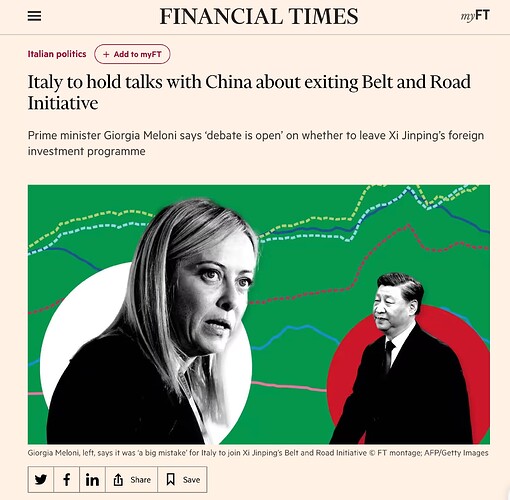-
意大利正在考虑退出中国的旗舰基础设施投资计划,即 "一带一路 "倡议(BRI)。
-
总理乔治亚-梅洛尼尚未就此事作出决定,但他希望找到一种方法,在不激起北京的愤怒的情况下从BRI中脱身。
-
意大利需要在为期四年的协议于2024年3月到期前三个月通知中国政府其退出的意图。
-
由于梅洛尼支持乌克兰,美国对意大利的压力最近有所缓解。
-
与北京畅通的沟通渠道可能有助于向中国施压,推动结束乌克兰的战争。
-
意大利的商业界对可能的退出感到担忧,因为2023年第一季度对中国的出口激增。
-
中国外交部表示,它认为罗马应该继续挖掘BRI合作的潜力。
-
它认为发展中意关系的成果应该使两国受益。
-
北京人民大学国际关系学教授时殷弘认为,意大利目前的困境反映了过去意大利政府对北京的 “机会主义做法”。
-
民粹主义五星运动的朱塞佩-孔特推动意大利在2019年加入金砖国家,而马里奥-德拉吉则更加警惕,利用黄金权力阻止中国的一些收购。
-
梅洛尼总理也对北京持谨慎态度,并利用黄金权力审查一家中国国有化工巨头拥有倍耐力37%股份的影响。她还批评了北京的人权记录,并对台湾表示支持。
-
梅洛尼对北京的戒心得到了意大利大部分政治机构的认同,公众的态度已经恶化,特别是在大流行期间。
-
前任政府认为中国是意大利历史问题的解决方案,但现在各方已经 “放弃了中国可以解决意大利问题的想法”。
-
意大利参与 "金砖倡议 "后,在交通基础设施的核心提议上几乎没有进展,一家中国国营公司在热那亚港附近的防波堤大坝的公开招标中失利。
-
一些分析人士认为,梅洛尼的最佳方案是维持现状,让交易自动续约。
-
另一些人说,在中美关系紧张加剧的情况下,梅洛尼需要发出一个明确的信号,“不能同时拥有中国和美国”。
-
停止一个模糊的合作会比让它自动续约发出更多的声音。
-
Italy is considering exiting from China’s flagship infrastructure investment programme, Belt and Road Initiative (BRI).
-
Prime Minister Giorgia Meloni has not yet decided on the matter, but wants to find a way to extricate itself from the BRI without provoking Beijing’s wrath.
-
Italy needs to notify Beijing of its intent to withdraw three months before the four-year agreement expires in March 2024.
-
US pressure on Italy has eased recently as Meloni has supported Ukraine.
-
Open channels of communication with Beijing could be useful in pressing China to push for an end to the war in Ukraine.
-
Italy’s business community is worried about a possible withdrawal, as exports to China have surged in the first quarter of 2023.
-
China’s foreign ministry has expressed its belief that Rome should continue to tap the potential for BRI cooperation.
-
It believes the fruits of developing the China-Italy relationship should benefit the two countries.
-
Shi Yinhong, a professor of international relations at Renmin University in Beijing, believes that Italy’s current conundrum reflects “the opportunist approaches” of past Italian governments towards Beijing.
-
Giuseppe Conte, of the populist Five Star Movement, drove Italy’s entry into the BRI in 2019, while Mario Draghi was more wary and used golden powers to block several Chinese acquisitions.
-
Prime Minister Meloni is also wary of Beijing and has used golden powers to scrutinise the impact of a Chinese state-owned chemical giant owning a 37% stake in Pirelli. She has also criticised Beijing’s human rights record and expressed support for Taiwan.
-
Meloni’s wariness towards Beijing is shared by much of Italy’s political establishment and public attitudes have deteriorated, particularly during the pandemic.
-
Former governments thought that China was the solution to Italy’s historical problems, but now parties have “abandoned the idea that China could solve Italian problems”.
-
Italy’s participation in the BRI brought little progress on core offers of transport infrastructure and a Chinese state company lost an open tender for a breakwater dam near the Port of Genoa.
-
Some analysts believe that Meloni’s best course would be to maintain the status quo and let the deal be renewed automatically.
-
Others say that Meloni needs to send a clear signal in a world of heightened US-China tensions and “cannot have China and the US at the same time”.
-
Halting a vague collaboration would make more noise than letting it be renewed automatically.
